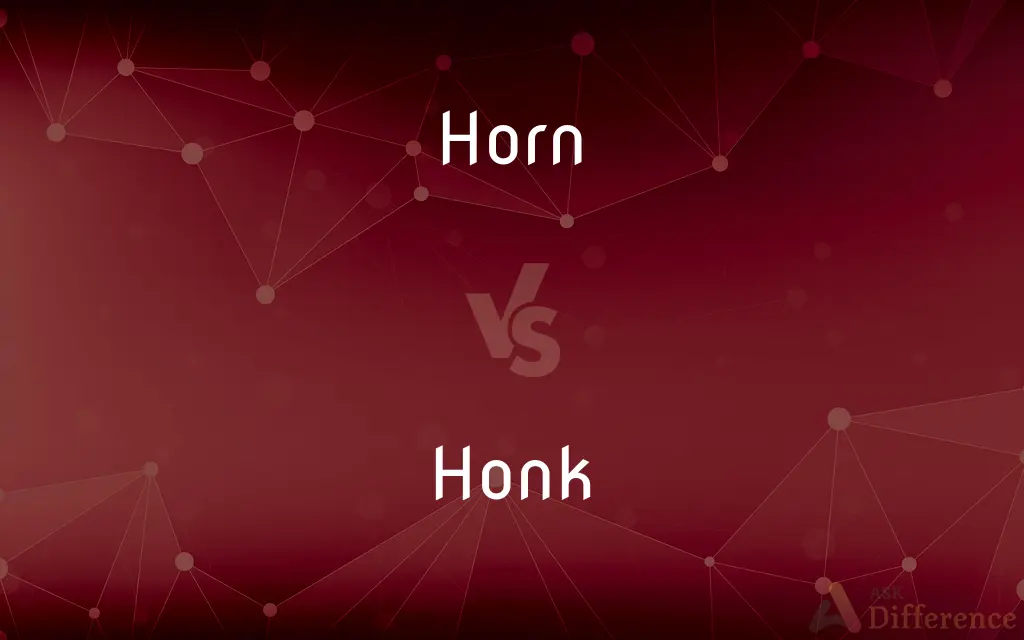Horn vs. Honk — What's the Difference?
Edited by Tayyaba Rehman — By Maham Liaqat — Updated on April 22, 2024
A horn refers to the sound-producing device in vehicles or an animal's bony outgrowth; honk is the specific sound made by a horn or geese.

Difference Between Horn and Honk
Table of Contents
ADVERTISEMENT
Key Differences
A horn can be a device used in vehicles to emit sounds for signaling, or it can refer to a natural feature on animals such as deer or rhinos. On the other hand, a honk specifically denotes the noise produced by a vehicle's horn or by geese.
In terms of functionality, vehicle horns are designed to alert other drivers or pedestrians, potentially averting accidents. Conversely, a honk is used as an auditory signal in traffic to communicate urgency or presence.
Horns as anatomical structures serve various purposes, like defense or mating displays in animals. Whereas the honk of a goose is used primarily for communication within the flock or as a defensive signal against perceived threats.
The design and sound of vehicle horns can vary widely, from the deep tones of a truck horn to the sharp beep of a scooter. In contrast, a honk typically refers to a sharp, loud sound, which is distinctive and immediately recognizable.
Musical instruments like French horns also utilize the term "horn," showcasing its versatility beyond the automotive and animal realms. The term "honk," however, remains firmly associated with specific sounds in nature and human-made environments.
ADVERTISEMENT
Comparison Chart
Definition
Sound-making device or animal's bony feature
Specific sound made by horns or geese
Usage Context
Vehicles, animals, musical instruments
Specific to sounds in traffic and nature
Function
Alerting, defense, mating displays
Communication, alerting in specific contexts
Variability
Wide range of types and functions
More limited, specific sound
Associated Terms
Air horn, antler, French horn
Goose, car horn, beep
Compare with Definitions
Horn
Used metaphorically to imply loudness or attention-grabbing.
The event started with the blare of horns.
Honk
Informally, to use a car horn.
She honked at the other driver who was drifting into her lane.
Horn
A device on vehicles for making a loud warning sound.
He honked the car's horn to alert the pedestrian.
Honk
The sound made by a goose.
We heard the geese honk as they flew overhead.
Horn
A brass musical instrument with a flared bell and a coiled tube.
She played a solo on the French horn in the orchestra.
Honk
A loud sound from a car's horn.
The taxi driver gave a sharp honk to get through the traffic.
Horn
A device to amplify sound or to signal.
The factory signals the end of shifts with a loud horn.
Honk
Sometimes used to describe a person's laugh if it is loud and somewhat abrasive.
His honk of a laugh could be heard across the room.
Horn
A hard permanent part of the head of some animals, like deer or buffalo.
The buffalo charged with its horns lowered.
Honk
Used to describe a quick, loud beep.
A honk alerted him to the danger approaching from behind.
Horn
A hard permanent outgrowth, often curved and pointed, found in pairs on the heads of cattle, sheep, goats, giraffes, etc. and consisting of a core of bone encased in keratinized skin.
Honk
The cry of a wild goose.
Horn
The substance of which horns are composed
Powdered rhino horn
Honk
Make or cause to make a honk
Geese circled around and honked
Fans honked their horns
Horn
A horn-shaped projection or object.
Honk
Vomit.
Horn
A wind instrument, conical in shape or wound into a spiral, originally made from an animal horn (now typically brass) and played by lip vibration.
Honk
The raucous, resonant sound characteristic of a wild goose.
Horn
A device sounding a warning or other signal
A car horn
Honk
A sound similar to a goose's honk
Blew a loud honk on the bass saxophone.
Horn
(of an animal) butt or gore with the horns
The bull horned him out of the way
Honk
The blaring sound of the horn on a motor vehicle.
Horn
Be unfaithful to (one's husband or wife)
All the time he was horning his wife
Honk
To emit a honk.
Horn
One of the hard, usually permanent structures projecting from the head of certain mammals, such as cattle, sheep, goats, or antelopes, consisting of a bony core covered with a sheath of keratinous material.
Honk
To cause (a horn) to produce a honk.
Horn
A hard protuberance, such as an antler or projection on the head of a giraffe or rhinoceros, that is similar to or suggestive of a horn.
Honk
To use a car horn.
They stood and observed how long it took for the other cars to honk.
Horn
The hard smooth keratinous material forming the outer covering of the horns of cattle or related animals.
Honk
(intransitive) To make a loud, harsh sound like a car horn.
Horn
A natural or synthetic substance resembling this material.
Honk
(intransitive) To make the vocal sound of a goose.
Horn
A container, such as a powder horn, made from a horn.
Honk
(slang) To vomit: regurgitate the contents of one's stomach.
Horn
A horn of plenty; a cornucopia.
Honk
(slang) To have a bad smell.
Horn
Either of the ends of a new moon.
Honk
The harsh note produced by a typical car horn.
Horn
The point of an anvil.
Honk
The cry of a goose or similar bird.
Horn
The pommel of a saddle.
Honk
(slang) A bad smell.
Horn
An ear trumpet.
Honk
Imitation of car horn, used, for example, to clear a path for oneself.
Horn
A device for projecting sound waves, as in a loudspeaker.
Honk
The cry of a wild goose.
Horn
A hollow, metallic electromagnetic transmission antenna with a circular or rectangular cross section.
Honk
To make a sound like the honk of a goose.
Horn
A wind instrument made of an animal horn.
Honk
To sound the horn on an automobile or other motor vehicle.
Horn
A brass instrument, such as a trombone or tuba.
Honk
The cry of a goose (or any sound resembling this)
Horn
A French horn.
Honk
Make a loud noise;
The horns of the taxis blared
Horn
A wind instrument, such as a trumpet or saxophone, used in a jazz band.
Honk
Use the horn of a car
Horn
A usually electrical signaling device that produces a loud resonant sound:an automobile horn.
Honk
Cry like a goose;
The geese were honking
Horn
Any of various noisemakers operated by blowing or by squeezing a hollow rubber ball.
Honk
Eject the contents of the stomach through the mouth;
After drinking too much, the students vomited
He purged continuously
The patient regurgitated the food we gave him last night
Horn
(Slang)A telephone.
Horn
To join without being invited; intrude. Used with in.
Horn
(countable) A hard growth of keratin that protrudes from the top of the head of certain animals, usually paired.
Horn
Any similar real or imaginary growth or projection such as the elongated tusk of a narwhal, the eyestalk of a snail, the pointed growth on the nose of a rhinoceros, or the hornlike projection on the head of a demon or similar.
Horn
An antler.
Horn
(uncountable) The hard substance from which animals' horns are made, sometimes used by man as a material for making various objects.
An umbrella with a handle made of horn
Horn
The high pommel of a saddle; also, either of the projections on a lady's saddle for supporting the leg.
Horn
(architectural element) The Ionic volute.
Horn
(nautical) The outer end of a crosstree; also, one of the projections forming the jaws of a gaff, boom, etc.
Horn
(carpentry) A curved projection on the fore part of a plane.
Horn
One of the projections at the four corners of the Jewish altar of burnt offering.
Horn
(countable) Any of several musical wind instruments.
Horn
An instrument resembling a musical horn and used to signal others.
Hunting horn
Horn
A loud alarm, especially one on a motor vehicle.
Horn
A sound signaling the expiration of time.
The shot was after the horn and therefore did not count.
Horn
(countable) A conical device used to direct waves.
Antenna horn
Loudspeaker horn
Horn
Generally, any brass wind instrument.
Horn
A telephone.
Get him on the horn so that we can have a discussion about this.
Horn
An erection of the penis.
Horn
A peninsula or crescent-shaped tract of land.
To navigate around the horn
Horn
(countable) A diacritical mark that may be attached to the top right corner of the letters o and u when writing in Vietnamese, thus forming ơ and ư.
Horn
(botany) An incurved, tapering and pointed appendage found in the flowers of the milkweed (Asclepias).
Horn
(military) In naval mine warfare, a projection from the mine shell of some contact mines which, when broken or bent by contact, causes the mine to fire.
Horn
To assault with the horns.
Horn
(transitive) To furnish with horns.
Horn
To cuckold.
Horn
A hard, projecting, and usually pointed organ, growing upon the heads of certain animals, esp. of the ruminants, as cattle, goats, and the like. The hollow horns of the Ox family consist externally of true horn, and are never shed.
Horn
The antler of a deer, which is of bone throughout, and annually shed and renewed.
Horn
Any natural projection or excrescence from an animal, resembling or thought to resemble a horn in substance or form;
Horn
An incurved, tapering and pointed appendage found in the flowers of the milkweed (Asclepias).
Horn
Something made of a horn, or in resemblance of a horn
Horn
One of the curved ends of a crescent; esp., an extremity or cusp of the moon when crescent-shaped.
The moonWears a wan circle round her blunted horns.
Horn
The curving extremity of the wing of an army or of a squadron drawn up in a crescentlike form.
Sharpening in mooned hornsTheir phalanx.
Horn
The tough, fibrous material of which true horns are composed, being, in the Ox family, chiefly albuminous, with some phosphate of lime; also, any similar substance, as that which forms the hoof crust of horses, sheep, and cattle; as, a spoon of horn.
Horn
A symbol of strength, power, glory, exaltation, or pride.
The Lord is . . . the horn of my salvation.
Horn
An emblem of a cuckold; - used chiefly in the plural.
Horn
The telephone; as, on the horn.
Horn
A body of water shaped like a horn; as, the Golden Horn in Istanbul.
Horn
To furnish with horns; to give the shape of a horn to.
Horn
To cause to wear horns; to cuckold.
Horn
A noisemaker (as at parties or games) that makes a loud noise when you blow through it
Horn
One of the bony outgrowths on the heads of certain ungulates
Horn
A noise made by the driver of an automobile to give warning;
Horn
A high pommel of a Western saddle (usually metal covered with leather)
Horn
A brass musical instrument with a brilliant tone; has a narrow tube and a flared bell and is played by means of valves
Horn
Any outgrowth from the head of an organism that resembles a horn
Horn
The material (mostly keratin) that covers the horns of ungulates and forms hooves and claws and nails
Horn
An alarm device that makes a loud warning sound
Horn
A brass musical instrument consisting of a conical tube that is coiled into a spiral and played by means of valves
Horn
A device on an automobile for making a warning noise
Horn
Stab or pierce with a horn or tusk;
The rhino horned the explorer
Common Curiosities
Is there a difference in the sound between various vehicle horns?
Yes, vehicle horns can vary significantly in sound, from sharp beeps to deep blasts, depending on the vehicle size and design.
How do cultural perceptions of horn usage vary?
Cultural perceptions can vary widely; in some places, horn use is frequent and casual, while in others it may be considered rude or aggressive.
What is the primary function of a horn in cars?
The primary function is to alert others to the vehicle’s presence, thus preventing accidents.
Why do geese honk?
Geese honk to communicate with each other, especially to maintain flock formation or warn of potential threats.
Can horns be musical instruments?
Yes, horns include musical instruments such as the French horn, known for its distinct, mellow sound.
What does it mean when someone uses their car horn excessively?
Excessive use often indicates impatience or frustration in traffic, although it can vary by regional driving culture.
Are animal horns always bone?
Not always; they can also be made of keratin, like in the case of rhinoceros horns, or a combination of bone and keratin as seen in deer.
How do horns function as defense mechanisms in animals?
In animals, horns are used for self-defense against predators or rivals, as well as in mating displays to impress potential mates.
Do all cars have the same horn sound?
No, car horn sounds can vary based on the make and model of the vehicle; manufacturers design different horn sounds to match the vehicle’s size and style.
What is the etiquette surrounding horn use in different countries?
Horn etiquette varies by country; in some places, frequent honking is normal and expected, while in others, it is reserved for emergencies only.
What differentiates a honk from other sounds a car horn can make?
A honk specifically refers to a loud, quick sound typical of many car horns, intended to grab immediate attention.
Can honking be legally regulated?
Yes, many areas have laws regarding when and how loudly you can honk, often prohibiting unnecessary honking.
What role does the honk play in driving?
In driving, honking serves as a crucial alert mechanism to prevent accidents or signal to other drivers.
Why might someone use a horn in a non-traffic situation?
Horns might be used in non-traffic situations for celebrations, starting sports events, or as alarms in industrial settings.
How are horns used in classical music?
In classical music, horns are used for their rich tonal qualities and dynamic range, playing everything from melody lines to harmonic support.
Share Your Discovery

Previous Comparison
Acrostic vs. Mnemonic
Next Comparison
Escalator vs. LiftAuthor Spotlight
Written by
Maham LiaqatEdited by
Tayyaba RehmanTayyaba Rehman is a distinguished writer, currently serving as a primary contributor to askdifference.com. As a researcher in semantics and etymology, Tayyaba's passion for the complexity of languages and their distinctions has found a perfect home on the platform. Tayyaba delves into the intricacies of language, distinguishing between commonly confused words and phrases, thereby providing clarity for readers worldwide.
















































